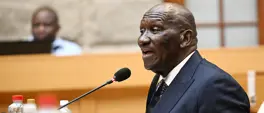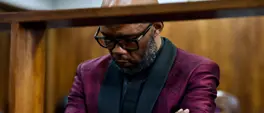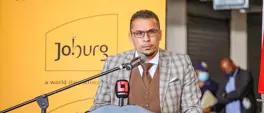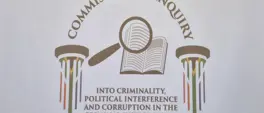MALAIKA MAHLATSI: Can the EFF overcome the cult of Malema?
Malaika Mahlatsi
28 July 2023 | 10:00The shadow of Malema that looms large over the organisation has become an impediment to the growth of the EFF, writes Malaika Mahlatsi.
OPINION
A decade ago, on a wintry July morning, a group of 1,200 delegates from across South Africa gathered at Uncle Tom’s Hall in the historic township of Orlando West in Soweto.
Among them was a delegation of mineworkers from Marikana and former miners whose hands built the unequal economy of our country, but who had since become part of the poor working-class majority. Other working-class groups including casual and domestic workers were also part of the delegation.
The occasion was the National Assembly, a national convention that was aimed at giving ideological substance and basis for the establishment of the Economic Freedom Fighters (EFF) as a political party that would contest State power.
The timing of this assembly coincided with the 60th anniversary of the failed attack on the Moncada Barracks in the city of Santiago de Cuba. On this occasion, a young and militant Fidel Castro and a group of his comrades led an attack on the army facility after the dictatorship of President Fulgencio Batista cancelled a free election in which Castro was a legislative candidate.
The men were subsequently arrested, and while in prison cemented the formation of what would be known as the 26th of July Movement.
The movement would go on to play a crucial role in the Cuban Revolution that would be marked by the overthrowing of Batista’s regime, marking the establishment of a socialist Cuba. The EFF chose this significant date as a symbolic expression of its own objective – to overthrow the African National Congress (ANC) government that it has defined as an enemy to the struggle for African liberation in South Africa.
Over the past few weeks, the EFF has been marking its 10th anniversary with various political and cultural events across the country.
These will culminate in a national event taking place at FNB stadium in Nasrec on the 29th of July, where thousands of EFF members and supporters will gather to celebrate a decade of the party’s existence.
In the days leading up to the event, there has been a lot of analysis from social commentators, political analysts, and academics alike about the impact that the EFF has had on South Africa’s political landscape.
There is no question that the EFF has re-written the political history of our country.
It has been engaged in important popular struggles in communities as well as within higher learning institutions. In the National Assembly, it has waged some important struggles in defence of the Constitution, against an ANC government that has often exhibited what EFF member of Parliament Dr Mbuyiseni Ndlozi aptly refers to as “constitutional delinquency”.
But perhaps more significant than all this, the EFF has captured the imagination of a generation that is unwilling to have the “the ANC liberated you” albatross around its neck.
Nonetheless, it is undebatable that the EFF has also introduced and reinforced problematic tendencies into our body politic, including but not limited to the institutionalisation of “great men” politics. And it is this which, more than its perpetual Damascene conversions (or flip-flopping) that poses the greatest danger to the future of the EFF.
Since its inception, the EFF has revolved around the personality of a charismatic and militant Julius Malema. While it may have made sense in the party’s infancy when it needed a leader who would assume the responsibility of mobilising and organising people around the idea of the organisation, it is concerning that a decade since its formation, the EFF continues to be modelled around the personality of Malema.
His figure continues to loom large over the governance and policy posture of the organisation. Nowhere was this more evident than in his decision to name and shame leaders of the party who could not procure buses to transport members to the 10th anniversary event at FNB Stadium.
The 428 members, two of whom are central command members, have been banned from attending the event. This act illustrates the extent to which Malema enjoys a monopoly of punishment in the organisation. He alone decides who deserves punishment and what that punishment must look like.
He has done it with the unilateral removal of leaders both within party structures and in Parliament. And evidently, members of the organisation are afraid to stand up to him because they know the consequences that come with that.
Some of those who were banned have spoken on condition of anonymity about the prohibitive costs of hiring buses when their pockets are already stretched by compulsory monthly contributions to the party. They will not speak out because they have seen others subjected to the public humiliation and mockery that Malema so casually metes out.
Malema has effectively become a metonymy of the EFF. When one speaks or thinks of the EFF, it is with Malema as its symbol. This is very dangerous for the organisation because it erodes its ability to exist beyond the character.
By Malema’s own admission, branches of the EFF are qualitatively weak and in desperate need of political education. The EFF as an organisation might have an impressive showing quantitatively, but the quality of its membership is so poor that it can barely articulate EFF ideology with the eloquence with which a few of its national and provincial leaders can.
The situation is worsened by the fact that there’s no coherent succession plan in the organisation. During both elections in 2014 and 2019, Malema was elected unopposed for the EFF presidency. He has claimed that this is a reflection of how hard he works.
And while this may be partially true, the element of his history of intimidating those who stand against him is well documented. From his days in the ANC Youth League, he has maintained power through the intimidation, expulsion, and public lynching of those who have differed or sought to contest him. It’s little wonder that no one in the EFF has been brave enough to stand against him, or even open discussions about a future in which Malema is not the leader of the party.
As the EFF enters the second decade of its existence, its members must begin to have critical conversations about a future without Malema and his perennial deputy, Floyd Shivambu.
The shadow of Malema that looms large over the organisation has become an impediment to the growth of the EFF.
Because he is a metonymy of the party, his personal flaws and limitations become associated with the organisation, eroding the sense of consistency, predictability, and democracy that voters want to see in a party that deems itself a government-in-waiting.
The mark of the maturity of the EFF lies not in how much it grows quantitatively or how many stadiums it can fill, but in how it sheds the cult of personality politics that have defined it for a decade.
If the EFF cannot do this, not only will it continue to be Malema’s fiefdom, but it will also institutionalise the calamitous retreat from the habit of thinking that’s already posing an existential crisis to the organisation.
Malaika Mahlatsi is a geographer and researcher at the Institute for Pan African Thought and Conversation. She is a PhD candidate at the University of Bayreuth, Germany.
Get the whole picture 💡
Take a look at the topic timeline for all related articles.
Trending News
More in Opinion
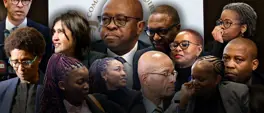
24 October 2025 04:24
MANDY WIENER | Shades of Selebi, Krejcir and Mdluli: We have seen this telenovela before

23 October 2025 08:50
CHARLES MATSEKE | How the Katiso Molefe case exposes South Africa’s descent into elite impunity

22 October 2025 06:36
JAMIL F. KHAN | 'Our queer community is not for sale': The fight to reclaim South Africa’s radical queer legacy
